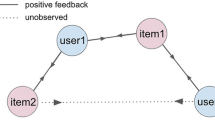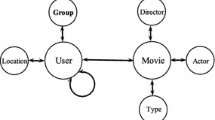Abstract
Heterogeneous information network contains richer semantic information, considering multiple types of objects and relationships to more accurately determine user preferences. In addition, existing approaches usually project each user to a point in the space, it is insufficient to accurately model the intensity of the user-item relationship and the heterogeneity of different types of objects and their relationships in implicit feedback. In order to solve these problems, we propose Predicting User Preferences via Heterogeneous Information Network and Metric Learning (PUHML). First, we use heterogeneous information networks to model complex heterogeneous data, and obtain users and item node representations. Second, we construct a user-item relationship vector, and translate each user toward items according to the user-item relationship. Finally, to alleviate the limitation of inner product as a scoring function, we introduce metric learning instead of dot product, and use distance to measure user preferences. Experimental results on three datasets demonstrates the effectiveness of our proposed approach over some competitive baselines.
Access this chapter
Tax calculation will be finalised at checkout
Purchases are for personal use only
Similar content being viewed by others
References
Shi, C., Li, Y., Zhang, J., Sun, Y., Philip, S.Y.: A survey of heterogeneous information network analysis. TKDE 29(1), 17–37 (2016)
Dong, Y., Chawla, N.V., Swami, A.: metapath2vec: scalable representation learning for heterogeneous networks. In: SIGKDD, pp. 135–144. ACM (2017)
Jamali, M., Ester, M.: A matrix factorization technique with trust propagation for recommendation in social networks. In: RecSys, pp. 135–142. ACM (2010)
Park, C., Kim, D., Xie, X., Yu, H.: Collaborative translational metric learning. In: ICDM, pp. 367–376 (2018)
Shi, C., Hu, B., Zhao, W.X., Yu, P.S.: Heterogeneous information network embedding for recommendation. IEEE Trans. Knowl. Data Eng. 31(2), 357–370 (2019)
Sun, Y., Han, J., Yan, X., Yu, P.S., Wu, T.: Pathsim: meta path-based top-k similarity search in heterogeneous information networks. PVLDB 4(11), 992–1003 (2011)
Li, W., et al.: Social recommendation using Euclidean embedding. In: IJCNN, pp. 589–595 (2017)
Grover, A., Leskovec, J.: Node2vec: scalable feature learning for networks. In: KDD, pp. 855–864. ACM (2016)
Bordes, A., Usunier, N., Garcia-Duran, A., Weston, J., Yakhnenko, O.: Translating embeddings for modeling multi-relational data. In: NIPS (2013)
Mnih, A., Salakhutdinov, R.R.: Probabilistic matrix factorization. In: Advances in neural information processing systems, pp. 1257–1264 (2008)
Yin, Y., Zheng, W.: An efficient recommendation algorithm based on heterogeneous information network. Complexity 2021(17), 1–18 (2021)
Gai, K., Qiu, M., Zhao, H., Sun, X.: Resource management in sustainable cyber-physical systems using heterogeneous cloud computing. IEEE Trans. Sustain. Comput. 3(2), 60–72 (2017)
Gai, K., Qiu, M.: Reinforcement learning-based content-centric services in mobile sensing. IEEE Netw. 32(4), 34–39 (2018)
Gai, K., Qiu, M.: Optimal resource allocation using reinforcement learning for IoT content-centric services. Appl. Soft Comput. 70, 12–21 (2018)
Yu, J., Min, G., Rong, W., Song, Y., Xiong, Q.: A social recommender based on factorization and distance metric learning. IEEE Access 5, 21557–21566 (2017)
Author information
Authors and Affiliations
Corresponding author
Editor information
Editors and Affiliations
Rights and permissions
Copyright information
© 2021 Springer Nature Switzerland AG
About this paper
Cite this paper
Li, X., Tang, Y., Yuan, Y., Chen, Y. (2021). Predicting User Preferences via Heterogeneous Information Network and Metric Learning. In: Qiu, H., Zhang, C., Fei, Z., Qiu, M., Kung, SY. (eds) Knowledge Science, Engineering and Management. KSEM 2021. Lecture Notes in Computer Science(), vol 12815. Springer, Cham. https://doi.org/10.1007/978-3-030-82136-4_53
Download citation
DOI: https://doi.org/10.1007/978-3-030-82136-4_53
Published:
Publisher Name: Springer, Cham
Print ISBN: 978-3-030-82135-7
Online ISBN: 978-3-030-82136-4
eBook Packages: Computer ScienceComputer Science (R0)




